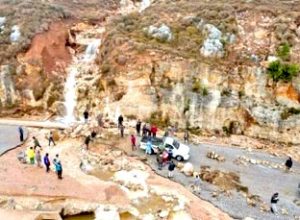Capitalist Disasters in North Africa here ♦ Fight Bosses’ Exploitation with Communist Working Class Unity here ♦

Capitalist Disasters in Morocco and Libya
“The ones who should’ve helped the people don’t care,” declared a Moroccan worker. His family members were among thousands of dead after a 6.8 earthquake levelled communities on September 8.
The same is said in Libya, where ten thousand or more are feared dead from unprecedented floods. Storm Daniel breached two dams and swept away a quarter of the city of Derna on September 10-11.
This is a capitalist disaster, not a “natural” one. The dams had not been maintained since 2002. Rival governments in Libya, linked to competing imperialist powers, are leaving many people to fend for themselves.
The workers are the ones who must help ourselves and each other. We must become the earthquake that tears down the capitalist system. The international working class must become the flood that sweeps away the exploiters who care only for the profits they wring from our labor.
As we dig each other out of capitalism’s rubble, we must prepare now to rebuild our world on the communist foundations of collectivity and sharing.
Fight Bosses’ Exploitation with Communist Working-Class Unity
GQEBERHA (South Africa), August 28— “It is my first time here and we were invited to come, so I want to know what this is about. What is this party about,” asked a new comrade at the start of a recent meeting. That opened a lively discussion.
Comrade T, who is relatively new, answered enthusiastically: “This party is about workers. We mobilize workers and fight for them”.
Another comrade added, “ICWP stands for the International Communist Workers’ Party. We mobilize the working class for communist revolution and to build a new society free of exploitation”. He continued, “Sometimes this exploitation can be hard to explain to new members, but every worker has felt it. The bosses don’t pay workers the value they’ve created. The value they created that isn’t paid to the workers is surplus value.
“Now often people confuse us for the Union, but we are not the Union. Primarily we are not focused on raising wages although we don’t reject it either. Our focus is all about mobilizing millions to end the very same system of wages instead of a 10% wage increase”.
We explained to the comrades that there is no way they can grow ideologically in the party without reading the Red Flag. We talked about how the Red Flag connects us with other workers around the world. It connects us with their struggles.
We then had our regular collective reading of Red Flag. In keeping with the women’s month here, we discussed an article on sexism, racism, and exploitation. A new female comrade said, “Yes, bosses would rather have us fighting each and not focus on them”.
Another continued, “Indeed, it’s easy to blame people of other races, but they didn’t give each other the work, the boss did. We need to recruit coloured, whites, and others and unite with them”.
One comrade said, “Yes, because we have more in common with coloured people who work and live within our neighbourhoods than, for example, with Ramaphosa, who is Black. That’s why we focus on uniting the working class of the world and fighting the exploitation system and not narrowly focus on race”.
The latter part of the meeting was about logistics. Comrades, especially new ones, will get chances to distribute the paper. Given that our number is growing, we decided that different comrades will go on different days, to give everyone a chance to have this experience.
As a comrade said, “Distributing the paper isn’t just about handing it out. Rather, you try and engage workers and their questions. Hence, we must read the Red Flag so that you are familiar with what is written. We can’t expect workers to read the paper if ourselves we don’t read it”.
Throughout the week, the comrades will be distributing the paper. Later, in the next meeting, we will have reports on that activity and progress. We are changing the meeting schedule so more comrades can come.
It was a very productive meeting. There were new faces, female comrades who were keen on learning more about us and communism in general. Also, some old comrades who haven’t been in a meeting for a while came and contributed to answering questions from the new comrades. It was great to see comrades’ comments about the articles, and about sexism and racism in general.

